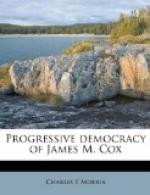At fifteen he left the elementary school to enter the Middletown High School, living with his sister, Mrs. John Q. Baker, whose husband was a teacher in the High School and owner of the Middletown Signal. Board was paid in working as a printer’s devil until the apprenticeship was served and the county newspaper business was mastered from both the counting room and the editorial side. Upon completion of his high school course, the young man passed the county examination and obtained a position as teacher of the school he had in earlier years attended, but a pedagogical career was not to his liking and he returned to work on the Signal staff. He became also the local correspondent for the Cincinnati Enquirer and attracted the attention of the main office by a neat scoop which he landed regarding a railroad wreck. Graduating into the reportorial work, he became assistant telegraph and railroad editor of the Enquirer. He retired from the newspaper life for a time to become Secretary to Congressman Sorg, remaining in his capacity until his 28th year, when he purchased the Dayton News, giving $12,000 in notes and beginning with a capital of just $80. The times were hard enough for the young chap with creditors constantly upon him. Once his paper was forced to suspend by reason of an unpaid bill, and the opposition paper heralded its death. The struggling publisher retaliated with an “extra” announcing its continuance. Then again there were plenty of libel suits for the young editor-publisher, setting out to be a reformer, and the ruling powers in the city strongly disapproved his methods, but the militant editor brought readers and the readers brought advertisers, and the venture became a success. Five years from his first venture he bought the Springfield Press Republic and the Springfield Democrat, combining the two in the Evening News. Each is now housed in its own modern newspaper building and each is highly prosperous as a business institution, although the owner’s supervision has been of a general character.
His associates always speak of the “Cox luck” in politics, but upon analysis it seems that it consists either of seizing or making the opportunity. In 1908 his Congressional district, originally Democratic, had become Republican, but a factional quarrel breaking out in the opposition camps, the Governor took the Democratic nomination and won out, again riding to victory in the great landslide of 1910. In Congress his career afforded him no opportunity to attain to high distinction, but he became a member of the appropriations committee and there became most deeply impressed with the waste in public funds and the unbusinesslike methods of arriving at appropriations. One of his services was the disclosure that the care of Civil War veterans in the National Soldiers’ Home at Dayton was shattered, and he won the contest for increased allowances. The gratitude of the veterans was expressed in a majority from the Home in his re-election in 1910, thus breaking an historical precedent.




